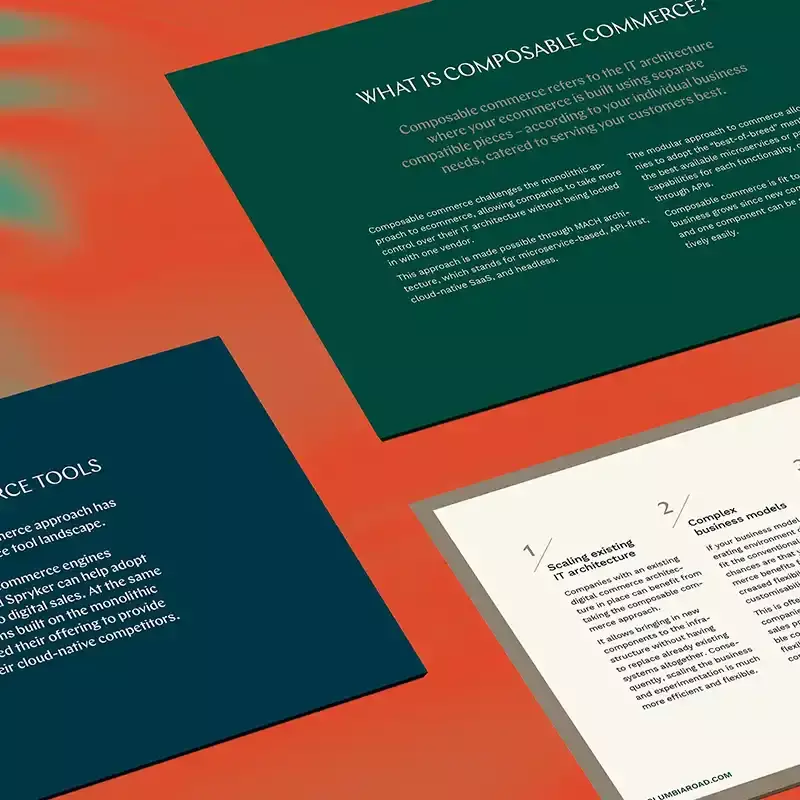The Data Handbook
How to use data to improve your customer journey and get better business outcomes in digital sales. Interviews, use cases, and deep-dives.
Get the bookI interviewed ten SEO professionals and content creators in different companies to identify the current and future state of SEO. Read on to find out whether SEO is dead (spoiler: it is not), how a startup gained 40x organic traffic with the help of AI and what the future of SEO looks like.
CURRENT STATE OF AI IN SEO
Like it or not, in the SEO world, we play by Google's rules—rules that change more often than a chameleon at a disco party. Guidelines on AI use are no different: while Google was initially against AI content, in 2023 this changed to only poor-quality AI content.
In 2024 March Core Update, we saw Google enforce their stance and go after AI spam sites. The message is clear - while generative AI tools enable faster content creation processes, mindlessly pumping out content is not the way to go in 2024. Instead, the use of AI tools like ChatGPT needs to be strategic.
In different news, Google finally introduced generative AI features to search in May 2024, catering to lucky searchers with guidance like how you should eat one small rock a day and put glue on your pizza.
While AI overviews have taken the internet meme space by storm, there are simultaneously more serious implications to consider. From Google becoming more of a black box to a decrease in organic traffic, AI search will impact the SEO landscape. I will cover this in a separate blog post so stay tuned or reach out to me to discuss more.
Now, let's dive into the sea of interview insights!
INTERVIEW INSIGHTS
The interviews were conducted in early 2024. Out of ten interviewees, four people were SEO consultants with 10+ years experience each, four worked as content creators and two were responsible for both SEO and content creation in their organisation. All interviewees were based in Finland. In the following chapters, I will recap the key findings and takeaways.
1. Different use cases for generative AI
Here you can see some of the current use cases for generative AI. Importantly, content writing is only a small part of the bigger puzzle. There are also manual actions you currently can’t totally replace with AI - for example, keyword research, keyword usage, implementing tone of voice and fact-checking.

While SEO professionals preferred to use AI in a more targeted fashion (e.g. updating individual sections at a time, analysing content gaps, troubleshooting poorly performing articles), content creators mostly used AI to write long-form text pieces which they would then edit or improve text they had created themselves.
Key takeaways:
- Do not fixate on content writing - also think about other AI use cases for SEO
- Align where not to use AI - this is equally important!
- Integrate AI into existing workflows - only coming up with use cases is not enough
2. Generative AI tools speed up content creation processes
The biggest benefits of AI are currently in faster content ideation and content creation. While the faster output pace was considered to be a positive development, content creators simultaneously expressed fears over increased requirements and more hectic work.
There was also some scepticism towards the performance of AI content, and few people associated AI use with laziness. Finally, SEO experts emphasised how content validation processes need to be adjusted to ensure only high-quality, human-reviewed content is published.
"Creating and producing new content has been the biggest bottleneck in SEO work for the past 15 years. Now that seems to be solved or soon to be solved." – Senior SEO Consultant
Key takeaways:
- Have open discussions between SEO experts and content creators about concerns over the future. Identify the underlying reasons. For instance, where does the scepticism towards AI originate from?
- Start with ideation if you are only beginning your generative AI journey - the impact is high and prompts are relatively straightforward
- Define content validation processes beforehand as increased speed means more content to be validated
3. Content created with AI performs well
The results seen with AI-co-created content were clearly positive, and there were numerous examples of content ranking on top of SERPs. The emphasis here is on co-created since human edits were necessary in all examples. With simple topics and listicles, AI content was considered to be almost good enough as is.
With more complex topics, more human adjustments are needed. Especially with YMYL topics (e.g. health, finance, legal, safety…), human edits are crucial as Google scrutinises those more.
One interviewee working at a startup had been able to 40x their organic traffic through programmatic article generation with Google Sheets, ChatGPT and Python scripts. Their strategy was based on combining user-generated expert reviews from an internal database with service descriptions from scraped websites. The resulting AI-created text piece was finally edited by a human before publishing.
While not all businesses have access to such a pool of user-generated data, this example demonstrates that it's still possible to balance generic AI text with unique insights. Moreover, this shows how content created en masse isn't necessarily a red flag for Google. With careful planning and caution, even programmatic content can meet Google’s quality rater guidelines and deliver unique value to users.
Key takeaways:
- Adjust your AI content strategy based on content type and complexity of the topic
- Always validate and edit AI text manually before publishing, especially with YMYL topics and more complex topics
- Think about ways you can make your content unique and insert real opinions
4. AI use is mostly individualistic and unstructured
While there were some companies with well-defined AI processes, AI use and information sharing was for the most part still individualistic and unstructured. In companies with higher AI maturity, prompt libraries, dedicated communication channels and AI sessions were used to share knowledge. Training sessions were a commonly preferred option for learning about AI as well.
In some instances, individualistic use of AI had resulted in excessive reliance on AI text. While SEO experts highlighted the importance of user experience and showcasing topical expertise, many content creators saw SEO more as creating content for Google only. Thus, they saw no harm in using AI text as is.
"If it's purely SEO content created for Google, for me it doesn't really matter if it's created by another machine or AI." – Content Creator
"The information is rather generic in nature and available from multiple sources. And if you want to differentiate and stand out and if the LLM scraped it out from other sources and public sources, it’s probably not good. We wanted our team who have like 30 years of experience to think about those factors rather than scrape from the web basically.” – Senior SEO Consultant
Key takeaways:
- Open up siloes on AI use through training, prompt libraries, dedicated sessions and communication channels
- Ensure everyone’s view on SEO is aligned through discussion and training
- Monitor AI text usage rates through conversations, questionnaires and checks like plagiarism detection
6. Shift from content creation to content validation
As text generation becomes faster and easier with AI, content creators will start to spend more time validating AI-written content. At the same time, SEO experts can now create even more specific content briefs. The danger of this development is that SEO writing is already perceived as not creative and a boring task by some.
Therefore, when readjusting content creation processes, it is crucial for SEO professionals to have discussions with content creators to set expectations. Simultaneously, the topical knowledge of content creators will become increasingly important in identifying mistakes in AI text and creating content that stands out from generic AI-written content.
Key takeaways:
- Have discussions between SEO experts and content creators on roles and expectations
- As an SEO, emphasise the importance of user-centricity when giving out content briefs - this may help combat the feelings of “boring” SEO tasks
- Put high emphasis on topical expertise in hiring decisions
- The increasing importance of prompt engineering
Prompt engineering was considered essential for getting quality AI responses. Too vague prompts easily result in more issues like excessively grandiose, fluffy and repetitive text. At the same time, prompting takes time and requires iterations. This resulted in feelings of frustration among copywriters and in them not spending time on tweaking prompts. In organisations with high AI maturity, prompt engineering was in the spotlight and prompt libraries were used to share ideas and centralise information.
Related to this were comments on how individuals can impact organisational-level AI adoption. In multiple interviews, there were examples of how if a single employee has AI capabilities and enthusiasm, this will easily spread across the whole organisation.
"I don’t think I have ever taken any content into use without prompting and prompting and prompting and reiterating the content." – Senior SEO Consultant
"It surely annoys me sometimes a lot how you try to formulate the prompt to ChatGPT to match what you are thinking." – Content Creator
"At least from my experience, it doesn't really depend on the company. It's more about the individuals working there. The industry might be very, very traditional and all, but there are some individuals who are really interested in AI." – Senior SEO Consultant
Key takeaways:
- Allow enough time for prompt engineering (this might require changes in role descriptions)
- Acknowledge the biggest issues in AI text to know when prompts need to be tweaked
- Hire people enthusiastic about AI and prompting - individuals have a big impact on organisational-level AI adoption
- Role implications for SEO experts and content creators
Instead of replacing any roles, AI tools are currently mostly woven into the existing roles. Multiple interviewees discussed how they saw AI still as a tool. Despite this, some mentioned how AI could be like a trainee within the team. However, the specific tasks for this “AI trainee” were not clearly defined. Translator was seen as the most likely role to be replaced by AI as the quality of AI translations (especially via DeepL) has been impressive.
Key takeaways:
- AI cannot yet fully replace roles in an SEO team. Instead, the contents of each role will change
- Define clear tasks to AI for improved efficiency
- Experiment with AI translations if you have not already
FINAL WORDS
“He who lives by the crystal ball will eat shattered glass.” – Ray Dalio, a famous American investor
While it is impossible to accurately foresee the future of SEO, we can make guesses based on Google’s past and future roadmap. For example, SEO professionals emphasised in the interviews how Google’s AI search features will decrease organic traffic if/when implemented.
However, remember that the Google chameleon might change colour any second. You can see this in action in how volatile AI search features have been. The bottom line is that you should not put all your trust in what Google is saying.
Simultaneously, experienced content creators with first-hand knowledge will become a valuable asset for organisations to stand out from the mass of AI-generated content. In the age of AI, unique content is the king.
Finally, AI will integrate into all team roles and shift the focus from content creation to content validation as covered earlier.
Ultimately, despite fancy names like AIO (artificial intelligence optimisation) or GEO (generative engine optimisation) being thrown around, the fundamentals of SEO remain the same in the age of AI. Build a solid technical foundation and create unique, user-focused content - that goes a long way.
The Data Handbook
How to use data to improve your customer journey and get better business outcomes in digital sales. Interviews, use cases, and deep-dives.
Get the book



